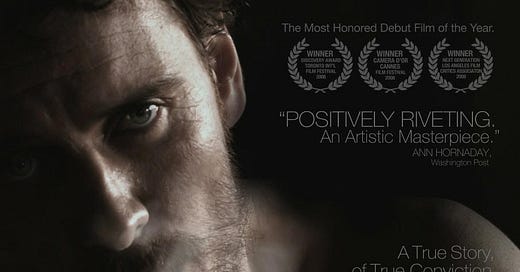Hunger (2008)
An exercise in the most enduring and acceptable strain of terrorist sympathy in Britain.
Released only a decade after the controversial signing of the Good Friday Agreement, the divisive subject at the centre of Hunger is granted a visceral depiction by Steve McQueen, winner of the 1999 Turner Prize. McQueen recruits a visual style of immediacy and a slow-burning gaze within the grim interiors of the Maze Prison, where Bobby Sands (Michael Fassbender) and other members of the Provisional Irish Republican Army (IRA) undertake a suicide-inducing hunger strike.
Hunger offers little in the way of relief for its viewers, who are faced with comprehending the film's historically-based events depicted as they are with a penetrating absence of dialogue in all but one scene; when Sands is on the Firing Line with Father Moran (Liam Cunningham). The pair's uninterrupted discussion is the screenwriters’ (McQueen & Enda Walsh) attempt to contextualise the impending hunger strike in a conveniently encapsulated 17-minute exchange; condensing topics from Irish nationalism, religion, family, to smoking pages of the Bible like a cigarette. This intense burst of expository information is sandwiched between the film's sparse former and latter sections, where naked bodies, excreted bodily matter and a visceral form of sadistic brutality is Hunger’s core affective focus.
The creative decisions made my McQueen leave Hunger in an unenviable position. Unable to whip up the rich several-course meal deserving of an appetite for a comprehensive understanding of a frequently misunderstood (and increasingly forgotten) conflict, Hunger uses the cinematic medium's sentimentalising devices to effectively glorify one faction while demonising the other. McQueen endorses the martyrdom of Bobby Sands - a figure whom most viewers neither know nor hitherto cared about - though this ensures that Hunger renders his opposing faction as the great enemy of human freedom. This laissez-faire tendency - that film should know no bounds, ideologically or otherwise - weaves a tangled web with a trending popular proclivity for criminal or terrorist sympathy. Such liberties of expression are often exercised with care, considering how their impact will not affect, say, legal matters which are ongoing. But in the year of 2008, when sporadic attacks from breakaway members of Bobby Sand's original faction continued to occur (and still do), Hunger must not be apolitically suspended from critique (as it was upon release), with remarks that “it's just a film”, or considerations with the “politics aside” disclaimer.
Steve McQueen's common-thread politics are to blame for such a dull rendering of a politically complex and fraught matter, but Hunger does at least serve as a humbling reminder of the universal requirement for education and basic literacy.
Hunger appeals:
· To fans of Steve McQueen’s visual art-inspired style of filmmaking, for which he was awarded the Caméra d'Or (first-time director) at the 2008 Cannes film festival.
· To fans of films about the Troubles, like In the Name of the Father (1993) and Some Mother's Son (1996).
· To fans of the IRA.
Be sure to:
· See Michael Fassbender’s disturbing physical transformation as Bobby Sands, as he fatally deteriorates from the effects of his hunger strike.
· Feel invigorated enough to learn more about Irish republicanism, the Good Friday Agreement, and their residual legacies.




